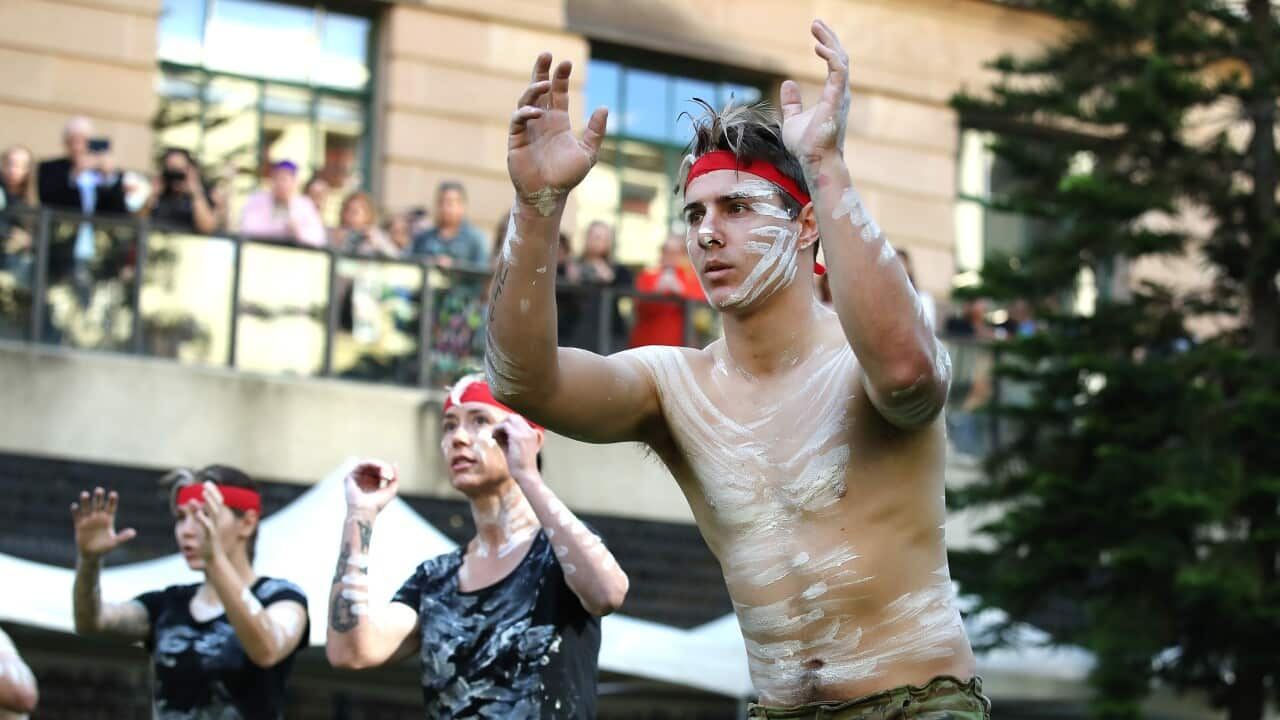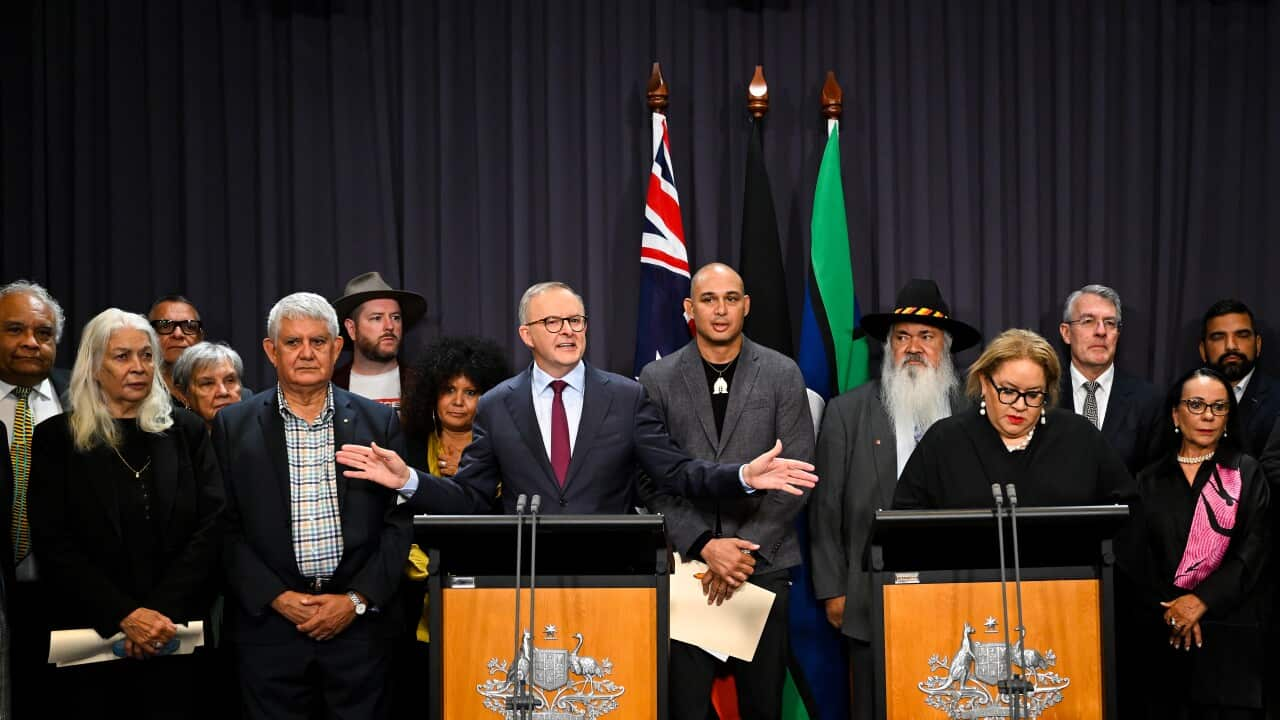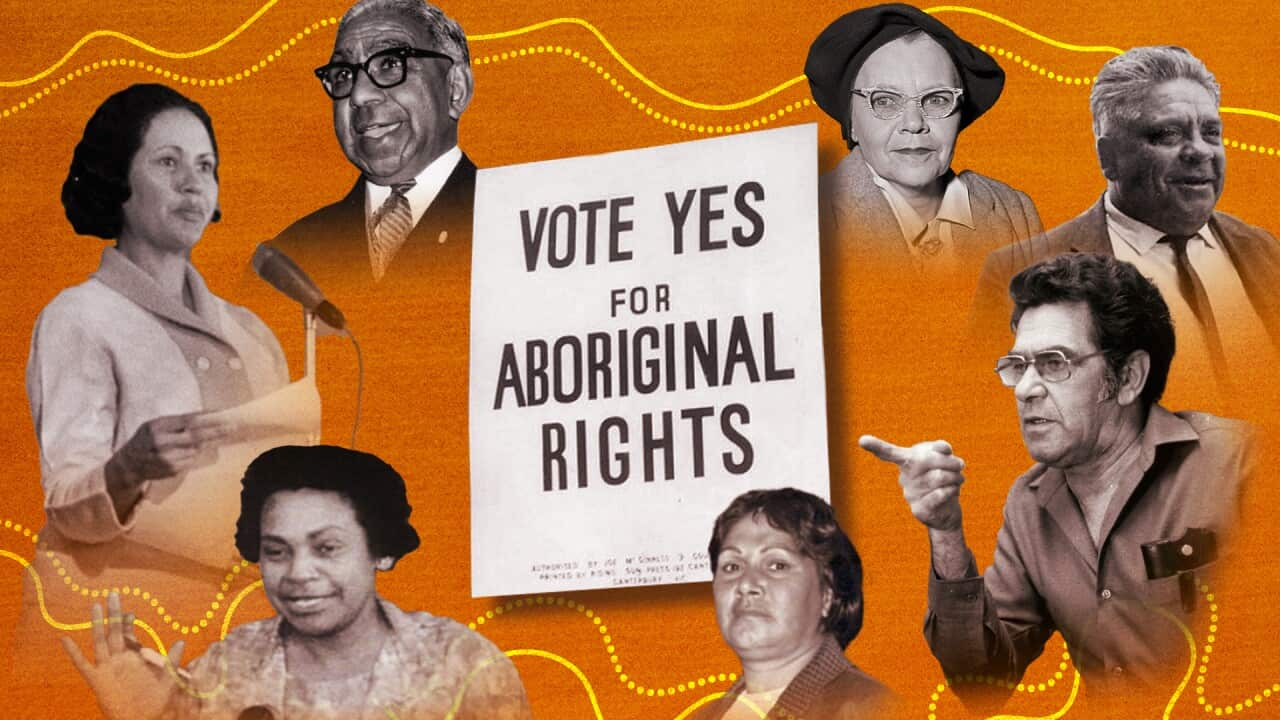Key Points
- National Reconciliation Week begins on 27 May each year, which marks the anniversary of the milestone 1967 referendum.
- This year's theme is 'Be a Voice for Generations'.
- Here's the history behind it, and why advocates say 2023's event is especially important.
National Reconciliation Week has kicked off around the country, and advocates say this year's event is especially significant due to the upcoming .
Running annually from 27 May to 3 June, organisers say the 2023 mission is to encourage "all Australians to be a voice for reconciliation in tangible ways in our everyday lives – where we live, work and socialise".
Each year, National Reconciliation Week features community events around the country that promote greater awareness and respect for First Nations culture and history and aims to strengthen the relationship between Aboriginal and Torres Strait Islander peoples and non-Indigenous Australians.
Here's a look back at the history behind the week, and its relevance to the present day.
What's the history behind National Reconciliation Week?
In 1996, the Council for Aboriginal Reconciliation launched Australia’s first National Reconciliation Week.
The week is now overseen by non-profit Reconciliation Australia, and 2023's theme is: 'Be a Voice for Generations'.
It "urges all Australians to use their power, their words and their actions to create a better, more just Australia for all of us", the group says.
The start and end date of the week mark two milestones in the reconciliation movement.
On , Australia recorded its most successful 'yes' vote in a referendum. More than 90 per cent of voters supported changing two provisions in the Constitution that were seen as discriminatory towards Aboriginal and Torres Strait Islander peoples.
It allowed Aboriginal and Torres Strait Islanders to be included in the national population count, the Census, but also marked a shift in attitudes.
On 3 June 1992, the Mer (Murray) Island man that recognised Indigenous Australians have rights to the land, leading to Native Title Act in 1993.
The six judges in the majority judgment ruled that the concept of terra nullius - Latin for 'land belonging to no one' - should not have been applied to Australia.
National Reconciliation Week 2023 sparks Voice debate
Organisers of National Reconciliation Week community events say the gatherings this year are especially significant considering is set to be held by the end of the year.
On Saturday, Minister for Indigenous Australians Linda Burney said that 56 years on from the 1967 referendum, it is important to remember the community support that led to the landslide 'yes' vote.
"It reminds us that this 'yes' did not happen on its own," she said during a speech marking the start of Reconciliation Week.
"In the 1950s and 1960s, activists had organised petitions and drawn attention to the numerous examples of discrimination and segregation across the country."
Ms Burney said this year's referendum on an Indigenous Voice to Parliament is about continuing that work.
"This referendum is about recognition and listening. [It is a] recognition that will acknowledge the 65,000 years to culture and country by Aboriginal and Torres Strait Islander people," she said.
The federal Coalition's Indigenous Australians spokeswoman, Jacinta Nampijinpa Price, said she remained firm in her opposition to the Voice, saying she doesn't believe it will achieve outcomes on the ground, particularly for remote Indigenous communities.
"This proposal is dangerous. It is risky. It is divisive and it will not improve the life of a single person who is living in disadvantage," Senator Price said on Saturday.
survivor Scott Wilson was a child in 1967, but he said he can still remember the impact of the referendum - and he urged Australians to support the Voice.
"What I remember, as a kid growing up in Darwin, was that at a certain time at night all the traditional folk would be locked up in a compound because they were not allowed out. After the 1967 referendum, that ceased," Mr Wilson said.
He also reflected on another milestone of the reconciliation movement, the in 2000 when hundreds of thousands of Australians took part.
"I was there when 200,000 Australians walked across the Sydney Harbour Bridge - and that was uplifting. 2023 is another uplifting journey for us; and we look forward to having a successful referendum later this year," Mr Wilson said.
A time to 'sit there and just reflect'
Shane James at the Wollotuka Institute at the University of Newcastle has co-organised a Reconciliation Week event promoting Indigenous knowledge as a resource to deal with environmental challenges like climate change.
The Rising from the Embers festival began three years ago after devastating bushfires, and this year the event is encouraging more people to adopt an open mindset of learning more about the wisdom contained in 65,000 years of Indigenous culture.
"It's a good time of the year for us to sit there and just reflect. When it comes to education - instead of just being handed answers, go educate yourself around our culture and have a yarn with our elders," Mr James said.

CEO of Reconciliation Australia Karen Mundine (right) addresses Stolen Generations survivors and advocates on the first day of Reconciliation Week. Source: Twitter / Reconciliation Australia
Co-organiser Diana Eades said attendance has grown over the past 13 years.
"It's the biggest event in this region for reconciliation. And really what we've been saying, especially this year now more than ever, is it is the time for non-Aboriginal people to stand with Aboriginal people very publicly and say that we stand for justice, equality, respect. And we stand against racism and scaremongering," she said.
Stolen Generations survivors, descendants and supporters gathered at Sydney's Royal Botanic Garden on Saturday to recognise the strength and resilience of the community.

Aunty Lorraine Darcy Peeters says the history of the Stolen Generations must not be forgotten. Source: SBS News
"For 14 years I was taught another culture and forced to forget my own," she told SBS News, adding that the Botanic Gardens event is about healing.
"You weren't allowed to speak language, or even talk about culture ... To de-program from that is a huge journey for a lot of people.
"We are here to stand our ground. This is Australia's story. Please own it. We (survivors) are not going anywhere. The story runs now through my great-grandchildren."
First Nations readers seeking mental health support can contact crisis support hotline .














